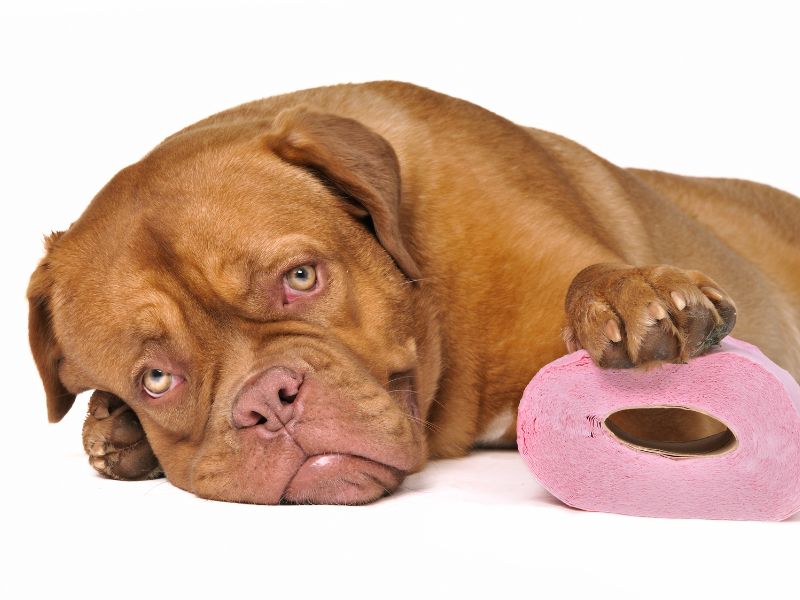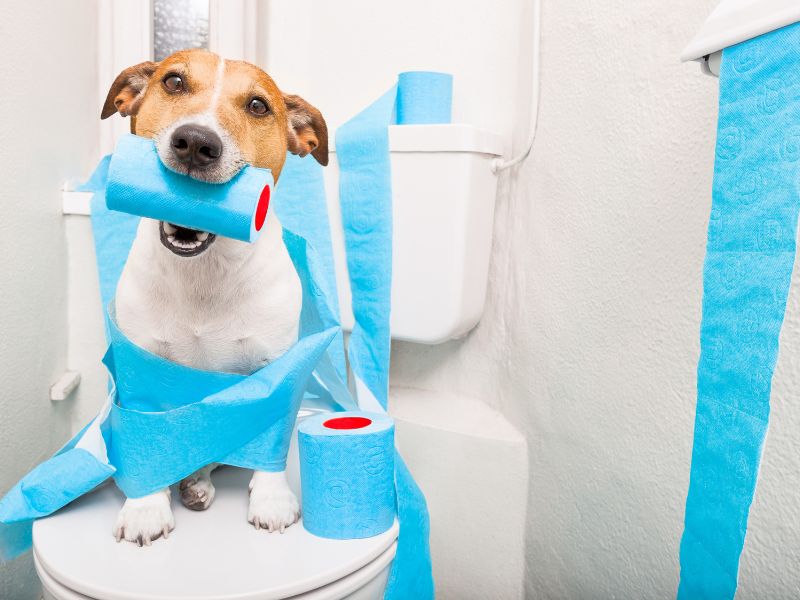Oh, no! Your dog’s had colon blow, and you’re both a mess about it. Stress colitis in dogs is a common digestive disorder that happens when stress or anxiety brings about inflammation in a dog’s colon, but the good news is that there are steps you can take to help prevent dog’s stress colitis.
What is stress colitis in dogs?
If your best friend struggles with dog’s colitis (also known as large bowel diarrhea), you know about it! It’s inflammation of your dog’s colon or dog’s large intestine, and when it’s inflamed, your dog will suffer from a host of digestive issues that include diarrhea, vomiting, abdominal pain, lethargy and even a lack of appetite.
It’s a common digestive disorder that’s brought about by stress or anxiety and that inflames your dog’s colon. The colon is a key organ in a dog’s digestive system and it helps absorb water and nutrients from food. It’s also important for the elimination of waste.
What causes canine colitis?
Stress colitis in dogs can come about for many reasons. Sometimes a dog is stressed when left alone for a period of time. Dogs often get stressed during special times of the year, like New Year’s or the Fourth of July, when fireworks are blaring.
Sometimes, occasions like Halloween bring about this digestive disorder because of the constant doorbell knocking/ringing. When a dog experiences stress or a stressful event, it can result in a weaker dog’s immune system, paving the way for bacterial infections and other medical issues. Giving calming supplements is a method that can be helpful in this cases.
Other causes of stress colitis in our canine companions can include exposure to new or stressful situations, irritable bowel syndrome, inflammatory bowel disease, being in contact with infected dogs, changes in their routine, intestinal worms, chronic exposure to wet environments, bacterial infection, or even changes in your dog’s diet. Dogs who have histories of anxiety are more prone to developing stress colitis.
What are the symptoms of canine stress colitis?
Stress colitis symptoms differ from dog to dog and from acute colitis to chronic colitis. The severity of the inflammation of their colon is really what dog’s symptoms and severity are based on. If your dog is suffering from things like diarrhea, soft or loose stool or abnormal bowel movements, vomiting, gut microbiome imbalances, abdominal pain, rapid weight loss, a lack of appetite or lethargy, they may also be dealing with colon inflammation.
Sometimes, dog colitis can be severe and include blood or mucus in the stool and the pups may need intravenous fluids to rehydrate. In those cases, it’s never a bad idea to consult with your veterinarian because you don’t want your dog to suffer from dehydration.
How is dogs stress colitis diagnosed?
If you believe that your dog has or is developing stress colitis, the first thing you should do is go to the vet. Early detection is key for a faster and better recovery.
In terms of specific tests, there are none. After checking your dog’s medical history and performing a physical examination, vets normally take a stool sample, give your dog’s gastrointestinal system or intestinal tract an x-ray or do colon biopsies. Although, further diagnostic tests may be needed.
These diagnostic tests are made to rule out conditions like inflammatory bowel disease (a chronic condition), irritable bowel syndrome, colonic tumors, and more.
How do you treat stress colitis in dogs?
If your dog is suffering from stress colitis, your veterinarian may offer some medicinal and dietary solutions. They may include a bland diet, prescription medication or anti-inflammatory medication, a dietary fiber, low residue diet, antibiotics or probiotics that include healthy bacteria. This type of beneficial bacteria has been proven to help the dog’s gastrointestinal tract, while promoting a healthy digestion, improving the bowel movement of your four-legged friend, and providing symptomatic relief.
When you are searching for an answer to “how to treat colitis”, another method might be fasting depending on your puppy and overall condition. Fasting can help the digestive system take a break. However, never fast young puppies and call your vet immediately if your puppy develops diarrhea.
When dogs suffer from stress colitis, stress management techniques may be helpful. If you are able to reduce your dog’s stress level, this can be a big part of treating stress colitis. Some stress management techniques include behavior modification training, pheromone therapy, CBD or other natural treatments (ginger, turmeric or probiotics are some popular natural treatments for colitis in dogs).

How can you prevent stress colitis in dogs?
The best thing for pet parents to do about colitis is to be proactive. As we said, if you can employ stress management techniques with your dog that help reduce their stress and anxiety, this can go a long way.
Additionally, there are a few other strategies that can help avoid stress colitis in dogs. They include:
- Keeping a regular, consistent routine. Dogs like routine and consistency. It can help them feel secure and know what to expect. If you can keep a consistent routine for exercise, feeding and other activities, you may be able to reduce stress induced colitis in your dog.
- Offer lots of mental and physical exercise. Often, boredom and a lack of exercise can increase their anxiety and stress. This is what can also aggravate their colon and bring on stress colitis. Exercise is the number one vet-recommended way to help alleviate anxiety. If you offer your dog plenty of physical and mental exercise, playtime and training, this can significantly reduce anxiety and stress.
- Try to keep your dog’s surroundings calm and peaceful. Loud noises or unfamiliar settings can be quite stressful to your dog. Consider calming techniques like pheromone diffusers, calm music or even items like the Thunder shirt to help keep their stress and anxiety at a minimum.
- Diet changes are the easiest way to help prevent stress colitis in dogs. Making sure that your dog has enough high-quality fiber in its diet is the easiest way to make dietary changes to avoid stress colitis. When your dog has good gut health, there’s less room for conditions like dysbiosis that can lead to inflammation of the dog’s colon. Supplementing your dog’s diet to aid in gut health is the best and easiest way to prevent stress colitis.
How does Bernie’s Perfect Poop help prevent stress colitis for your best friend?
Good gut health is key to good dog’s health overall, and that’s what Bernie’s Perfect Poop was designed to do. When your dog’s gut is in good health, it can digest its food better, and this reduces the risk of gastrointestinal issues that could plague its colon. A healthy gut better absorbs the nutrients from food, which fuels overall health and well-being. When your dog is suffering from stress colitis, it may not want to eat, so making sure they get maximum nutrition is important.
Perfect Poop has high-quality fiber that makes sure that food moves through the dog’s digestive tract at the right speed for maximum nutrition. It helps bulk up your dog’s stool, which is key to stopping diarrhea when the colon is inflamed. The pre- and probiotics in Perfect Poop help defend against harmful bacteria and other pathogens that can cause additional digestive issues, as well as help build up healthy immune function. The digestive enzymes break food down to make sure that your dog can absorb all the nutrition from it, and this leads to a healthier gut and dog. More, since stress colitis is often caused by anxiety or stress, ensuring the ‘second brain’ of your dog (their gut) is healthy can mean less stress and anxiety overall.
So, if your dog is prone to canine colitis, no need to stress–just be sure to add Bernie’s Perfect Poop to every meal.


